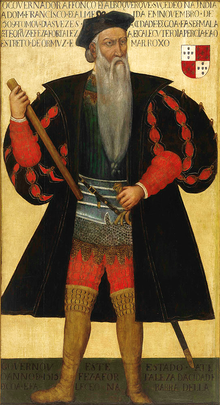
Back Alfonso d' Albuquerque Afrikaans ألفونسو دي ألبوكيرك Arabic أفونصو دي ألبوكيرك ARY الفونسو دى البوكيرك ARZ Alfonso de Albuquerque AVK Afonsu d' Albukerki Azerbaijani Афонсу ды Албукеркі Byelorussian Афонсу де Албукерке Bulgarian Afonso de Albuquerque Breton Afonso de Albuquerque Catalan
Afonso de Albuquerque | |
|---|---|
 | |
| 2nd Viceroy of Portuguese India | |
| In office 4 November 1509 – 8 September 1515 | |
| Monarch | Manuel I |
| Preceded by | Francisco de Almeida |
| Succeeded by | Lopo Soares de Albergaria |
| Personal details | |
| Pronunciation | Portuguese: [ɐˈfõsu ði alβuˈkɛɾkɨ] |
| Born | Afonso de Albuquerque c. 1453 Alhandra, Kingdom of Portugal |
| Died | 16 December 1515 (aged c. 62) Goa, Portuguese India, Portuguese Empire (now in India) |
| Children | Brás de Albuquerque |
| Occupation | Admiral Governor of India |
| Signature |  |
Afonso de Albuquerque, 1st Duke of Goa (c. 1453 – 16 December 1515), was a Portuguese general, admiral, and statesman. He served as viceroy of Portuguese India from 1509 to 1515, during which he expanded Portuguese influence across the Indian Ocean and built a reputation as a fierce and skilled military commander.[1][2][3]
Albuquerque advanced the three-fold Portuguese grand scheme of combating Islam, spreading Christianity, and securing the trade of spices by establishing a Portuguese Asian empire.[4] Among his achievements, Albuquerque managed to conquer Goa and was the first European of the Renaissance to raid the Persian Gulf, and he led the first voyage by a European fleet into the Red Sea.[5] He is generally considered a highly effective military commander,[6] and "probably the greatest naval commander of the age",[7] given his successful strategy — he attempted to close all the Indian Ocean naval passages to the Atlantic, Red Sea, Persian Gulf, and to the Pacific, transforming it into a Portuguese mare clausum.[8] He was appointed head of the "fleet of the Arabian and Persian sea" in 1506.[9]
Many of the conflicts in which he was directly involved took place in the Indian Ocean, in the Persian Gulf regions for control of the trade routes, and on the coasts of India. His military brilliance in these initial campaigns enabled Portugal to become the first global empire in history.[10] He led the Portuguese forces in numerous battles, including the conquest of Goa in 1510 and the capture of Malacca in 1511.
During the last five years of his life, he turned to administration,[11] where his actions as the second governor of Portuguese India were crucial to the longevity of the Portuguese Empire. He oversaw expeditions that resulted in establishing diplomatic contacts with the Ayutthaya Kingdom through his envoy Duarte Fernandes, with Pegu in Myanmar, and Timor and the Moluccas through a voyage headed by António de Abreu and Francisco Serrão. He laid the path for European trade with Ming China through Rafael Perestrello. He also aided in establishing diplomatic relations with Ethiopia,[12][13][14] and established diplomatic ties with Persia during the Safavid dynasty.[15]
Throughout his career, he received epithets such as "the Terrible",[16] "the Great",[2] "the Lion of the Seas",[17] "the Portuguese Mars",[8] and "the Caesar of the East".[17]
- ^ Ooi 2004, p. 137
- ^ a b Stephens 1897, p. 1
- ^ Butt 2005, p. 10
- ^ Ooi 2004, p. 17
- ^ Stevens 1711, p. 113
- ^ Cite error: The named reference
Foundationswas invoked but never defined (see the help page). - ^ Ricklefs 2002, p. 26
- ^ a b Chisholm 1911, p. 526
- ^ Aubin, J (1985). "Albuquerque, Alfonso De". Encyclopædia Iranica. Vol. 1 (8 ed.). pp. 823–824.
- ^ Erickson & Goldstein 2012, p. 403
- ^ Bandelier 1907.
- ^ Vilhena, Maria da Conceição (2001). "O Preste João: mito, literatura e história" [The Prester John: myth, literature and history] (PDF). Arquipélago: História Revista da Universidade Dos Açores. 5 (2 ed.). Universidade dos Açores: 14–15. ISSN 0871-7664. Archived (PDF) from the original on 9 October 2022.
- ^ Hespeler-Boultbee 2011, p. 186
- ^ Clough 1994, p. 85
- ^ Couto & Loureiro 2008, p. 219
- ^ Subrahmanyam 1998, p. 365
- ^ a b Cite error: The named reference
Albuquerquewas invoked but never defined (see the help page).
© MMXXIII Rich X Search. We shall prevail. All rights reserved. Rich X Search